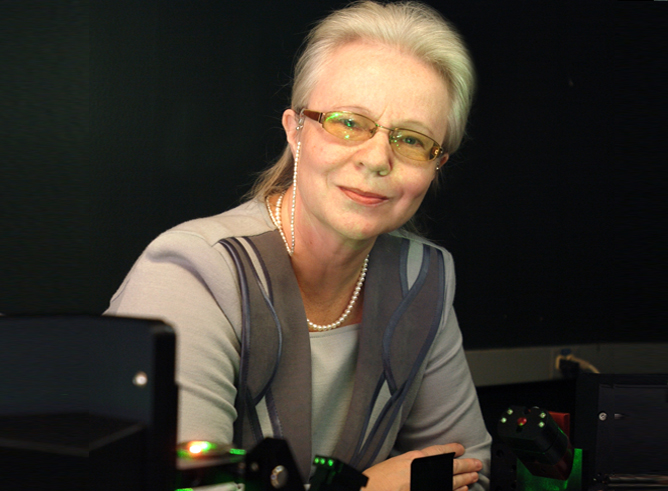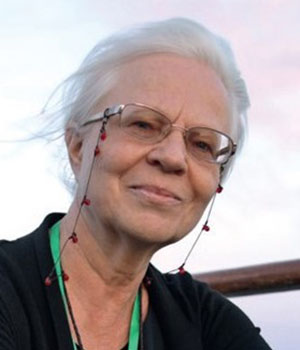
Dr. Olga Kocharovskaya, distinguished professor of physics and astronomy at Texas A&M University, has been selected to receive the 2024 Herbert Walther Award honoring pioneering research and leadership.
The award, jointly bestowed by Optica and the German Physical Society (DPG) and presented by each society in alternate years, recognizes distinguished contributions in quantum optics and atomic physics as well as leadership in the international scientific community. It was established in 2008 and named for Professor Herbert Walther, founding member and longtime director of the Max Planck Institute of Quantum Optics, in acknowledgement of the seminal influence of Walther’s path-breaking innovations in quantum optics and atomic physics as well as his wide-ranging contributions to the international scientific community.
Kocharovskaya, who is widely respected as one of the top quantum optics and laser physics researchers worldwide, joined the Texas A&M Department of Physics and Astronomy faculty in 1998 after 12 years as the leading research scientist at the Institute of Applied Physics of the Russian Academy of Sciences. She was appointed as a distinguished professor in 2007 and also is a member of the Institute for Quantum Science and Engineering.
Kocharovskaya is cited "for field-opening contributions to lasing without inversion and electromagnetically induced transparency and for theory and experiments that initiated the field of gamma-ray quantum optics." A trailblazer in her own right, she ranks as the first female professor in Texas A&M Physics and Astronomy history as well as the first woman to earn the Walther Award.
"An internationally renowned leader, Olga Kocharovskaya, is changing our understanding of quantum optics, laser physics and x-ray optics," said 2023 Optica President Michal Lipson. "Her pioneering work, dedicated service and inspirational mentorship will have a lasting impact on our community and field."

Kocharovskaya received her Ph.D. from the N.N. Lobachevsky Nizhny Novgorod State University in Russia in 1986 as well as a Dr. of Sciences (Habilitation) degree from the Highest Attestation Commission of the Russian Federation in 1996. Her research is in the areas of quantum and nonlinear optics, laser physics, x-ray optics, attosecond physics and quantum information science.
A pioneer in lasers, atomic physics, nonlinear optics and x-ray quantum optics, Kocharovskaya is credited with developing novel understandings of the way energy is transferred in atomic systems. For example, she predicted the phenomenon that causes a precisely prepared atom to become invisible to certain wavelengths of light, now called electromagnetically induced transparency. In addition, while it had long been cannon that lasing could only take place when a majority of atoms were energized to an excited electronic state, Kocharovskaya predicted lasing without population inversion, a new way of achieving the bright coherent light that lasers produce. And although gamma rays had been thought of more in the realm of high-energy physics than laser science, her discoveries in the coherent control of the optical electronic and gamma-ray nuclear transitions in solids have changed the fields of quantum optics, laser physics and x-ray optics.
Kocharovskaya has authored or co-authored more than 200 scientific papers, including her most recent work focused on development of new generation of atomic clocks. In addition, she is a dedicated volunteer and mentor, serving on editorial boards, international advisory boards and award committees, and organizing international conferences.
A fellow of both the American Physical Society (APS) and Optica, Kocharovskaya's previous recognitions include the 2023 APS Norman F. Ramsey Prize, the inaugural Willis Lamb Medal for Laser Physics and Quantum Electronics, the Presidential Award of the Russian Academy of Sciences as the Outstanding Young Professor of the Russian Federation, the Texas A&M Association of Former Students Distinguished Achievement Award in Research and the Sigma Xi Distinguished Scientist Award.
Optica (formerly known as The Optical Society of America), Advancing Optics and Photonics Worldwide, is the society dedicated to promoting the generation, application, archiving and dissemination of knowledge in the field. Founded in 1916, it is the leading organization for scientists, engineers, business professionals, students and others interested in the science of light. Optica’s renowned publications, meetings, online resources and in-person activities fuel discoveries, shape real-life applications and accelerate scientific, technical and educational achievement.
The German Physical Society (DPG), headquartered near Bonn, is the oldest national society and largest physical society in the world. As a non-profit organization with 62,000 members, DPG promotes the transfer of knowledge within the scientific community through conferences, events and publications. In addition to opening a window to physics for anyone who is curious to learn more, the society aims to encourage junior scientists and promote equal opportunities in science.
